Home » News » Thoughts on Virginia Tech’s visit to WaM and Vanderbilt
Thoughts on Virginia Tech’s visit to WaM and Vanderbilt
Posted by Douglas Fisher on Saturday, January 23, 2016 in News.
Doug Fisher is the Faculty Director of Warren College. This post reflects Doug’s opinions and not necessarily those of Vanderbilt University.
During the first week of Spring semester, Warren and Moore hosted a group from Virginia Tech’s Honors Residential College (HRC). The Faculty Principal, akin to Faculty Directors at Warren and Moore and Heads of House at The Ingram Commons, led his crew of six students from HRC’s student council and their equivalent of our graduate fellow/coordinator. We had lively meetings, exchanging practices of and ideas about our two residential college systems. Matthew Sinclair gave a great overview of WaM’s Community Development Plan, and assessment processes were discussed between the HRC team, Graduate Fellows Brooke and Grace, Director of Strategic Initiatives and Assessment Laura Walaszek, and Associate Dean of Students Pat Helland. The HRC team also met with Dean Vanessa Beasley, Asst Dean Nina Warnke, and Crawford Head of House Catherine McTamaney at The Martha Rivers Ingram Commons. Our time together was kicked off by a lovely reception at Professor Lovensheimer’s apartment, with many students, particularly council members, from both Warren and Moore. HRC gave a wonderful talk to a group of Vanderbilt faculty and students towards the end of the second day, with more details below. The full schedule was emailed and posted beforehand on our Facebook groups and the College Halls blog.
Of the many things that I so appreciated about what HRC is doing, one stood out well before HRC arrived, and in fact, within a few moments of reading the email proposing the visit from Professor Eric Kaufman, Faculty Principal — they are taking road trips to other residential colleges, and doing it cheaply. What better way to learn what other institutions of higher education are doing in residential life, and to bond as a team in the process, than to take your team on the road (literally) to talk to others! Last year HRC visited University of South Carolina’s Preston College. In general, they look for residential colleges within driving distance (e.g., on O’Hara’s Collegiate Way, a source that we’ve read for our residential college reading group), talk, and select among the options. The trip is made in a large VT-owned van, sleeping bags and air mattresses among the luggage, and the group is housed with residents — in our case, with student council and faculty hosts, as well as some rooms at WaM that were unoccupied at the time of the visit.
Warren and Moore weren’t open when HRC made their plans earlier, but we were on top of the list this year. And we are thankful for that. The Warren College Council has expressed interest in starting a road-trip series, and I think its money worth spending.
There are important differences between HRC and WaM that would inform how we adapted (or not) their practices and ideas, and vice versa. HRC is about 5 years old, and WaM is in year two. Residents of HRC must first be in VT’s Honors’ program and must maintain that status to remain in residence, though appeals and exceptions are allowed, with a student remediation plan in hand (as I understand it). HRC is a home to students from all four years, with about 40% first year, 30% sophomores, 20% juniors, and 10% seniors (I need to clarify how first year students are admitted). A large majority percentage of VT students live off campus. As an aside, I think that Vanderbilt is a much more vibrant community because the vast majority of our students live on campus, than it would be otherwise. I wonder whether, in an environment dominated by off-campus living, those communities on campus would be even tighter, relative to the campus as a whole, than it would be otherwise?
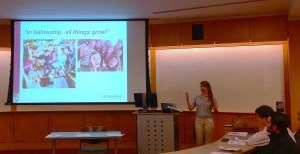
In an excellent talk, Melanie, HRC Council Historian followed Dr K's opening, with a presentation on HRC aspirations
In their excellent talk, HRC showed us an image of the high turnout to open student council meetings, but they noted that this level of engagement had taken attention and time. At the start of HRC, RAs were largely responsible for programming, but the the HRC council and other students are now largely responsible for programming (with the blessings of all, RAs included, though each RA still runs a couple of programs a month). Some activities that were student initiated and are long running are weekly soup nights, where a student volunteer has stepped up each year for the past few to create and serve soup once a week, like clockwork. Sunday morning pancakes follow the same model — yum to both! Both these activities are cited in this wonderful testimonial to HRC that I found on the Web, or this one goes into a bit of detail about soup night (try Googling soup night at HRC Virginia Tech)
All residents at HRC, first-year and upperclass, take a 1-credit hour seminar on HRC practices, policies, goals and visions, and traditions of their community. Indeed, the possibility of “College Halls seminars” noted in vision documents in WaM’s history are a generalization of this idea, as well as the first-year Commons seminars. That the HRC is running such seminars successfully, and for some time, is encouragement that we at WaM not forget about the possibility of (optional) upperclass 1-credit hour seminars. There are also “renegade seminars” at HRC, which are standalone events, initiated and led by both students and faculty. This reminded me of something that Patricia has suggested — that in addition to having our (Warren) dinners with faculty and staff guests as central “facilitators”, that we ask students to come in this role too. So that we might have one or more residents who just returned from study-abroad to come to dinner and talk about their experience; or a student who served in an internship; or a political campaign; and there are a slew of other experiences that would draw an interested few or a crowd — all good.
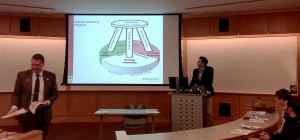
Sean, Director of Academic Enrichment, presenting on student leadership at HRC, with support from Dr. K
At HRC, suites are few, and are allotted to students who agree to to be community mentors and to make the suite’s common space available to the entire HRC. Indeed, a suite’s common space is technically considered HRC common space. No one should worry that this will become WaM policy, but it reminds me of the notable example of the inaugural residents on one second floor suite at Warren who opened their door to the larger community. What a great thing that was.
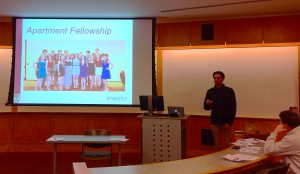
HRC's Graduate Assistant, Andrew, talking about Apartment fellowship, and the model of suite common space being HRC common space
The HRC group was very intrigued by the possibility of an interactive portal between WaM and HRC. While we successfully piloted the interactive portal in the Kissam Center with University College, Melbourne, earlier this year (and of course, the Commons portal installation was a great experience — I went twice!), a regular and consistent connection between WaM and Melbourne has been hampered by our differing summer breaks (we are in different hemispheres), various academic leaves and sabbaticals, even more so than due to the time differences. But a portal to HRC would be equally cool, perhaps as a portfolio of portal destinations, and this Tech(ie) group is enthusiastic. I plan to remind Professor Kaufman of that enthusiasm in the not too distant future 🙂 That is, if he doesn’t bug me first!
The HRC’s founding faculty principals were historians, and no surprise that there is a Historian on the HRC student council. This position, together with the others, notably the secretary and communications, are responsible for preserving a history of HRC. What a great idea! To a large extent we have also understood the importance of creating and preserving a WaM history, which is acknowledged in our Web pages, our blog, our Facebook groups, and tweets (and perhaps one day, by a student created Instagram account). For my part, I will probably start posting, to the History Web pages, public summaries of reports that I prepare each month and at the end of the year. But the idea that students, historians and otherwise, have a primary responsibility for documenting our community’s history is significant — talk about an immersive experience!
Thanks to HRC for thinking about us, visiting us, and thanks to all — more than any of us might think — who helped make this visit such a great experience. Let’s plan a road trip.
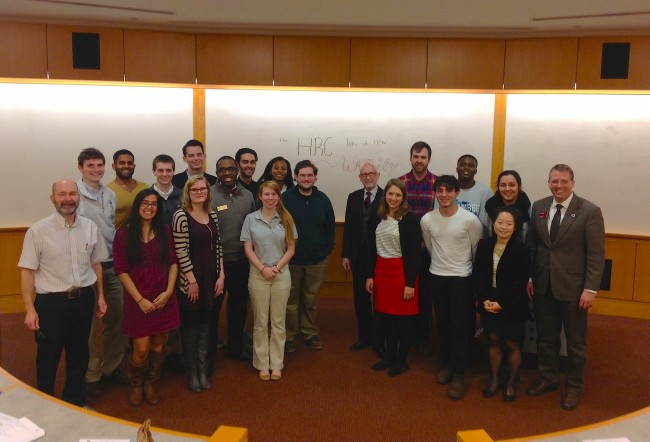
Post-HRC-talk pic. From roughly left to right: Doug (VU), Mitch (VT), Shawn (VU), Gargie (VT), Jordan (VT), Jamie (VT), Sean (VT), Linzie (VU), Andrew (VT), Melanie (VT), Jasmine (VU), William (VU), Dr. L (VU), Chelsie (VU), Nick (VU), Dean (VU), Chukwukpee (VU), Siham (VU), Grace (VU), Dr. K (VT). Photo by Matthew Sinclair (VU).

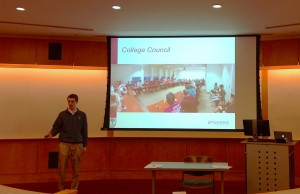
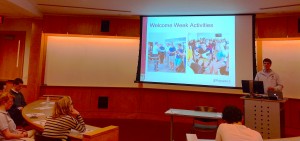
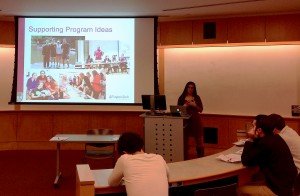
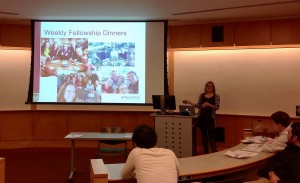
©2026 Vanderbilt University ·
Site Development: University Web Communications